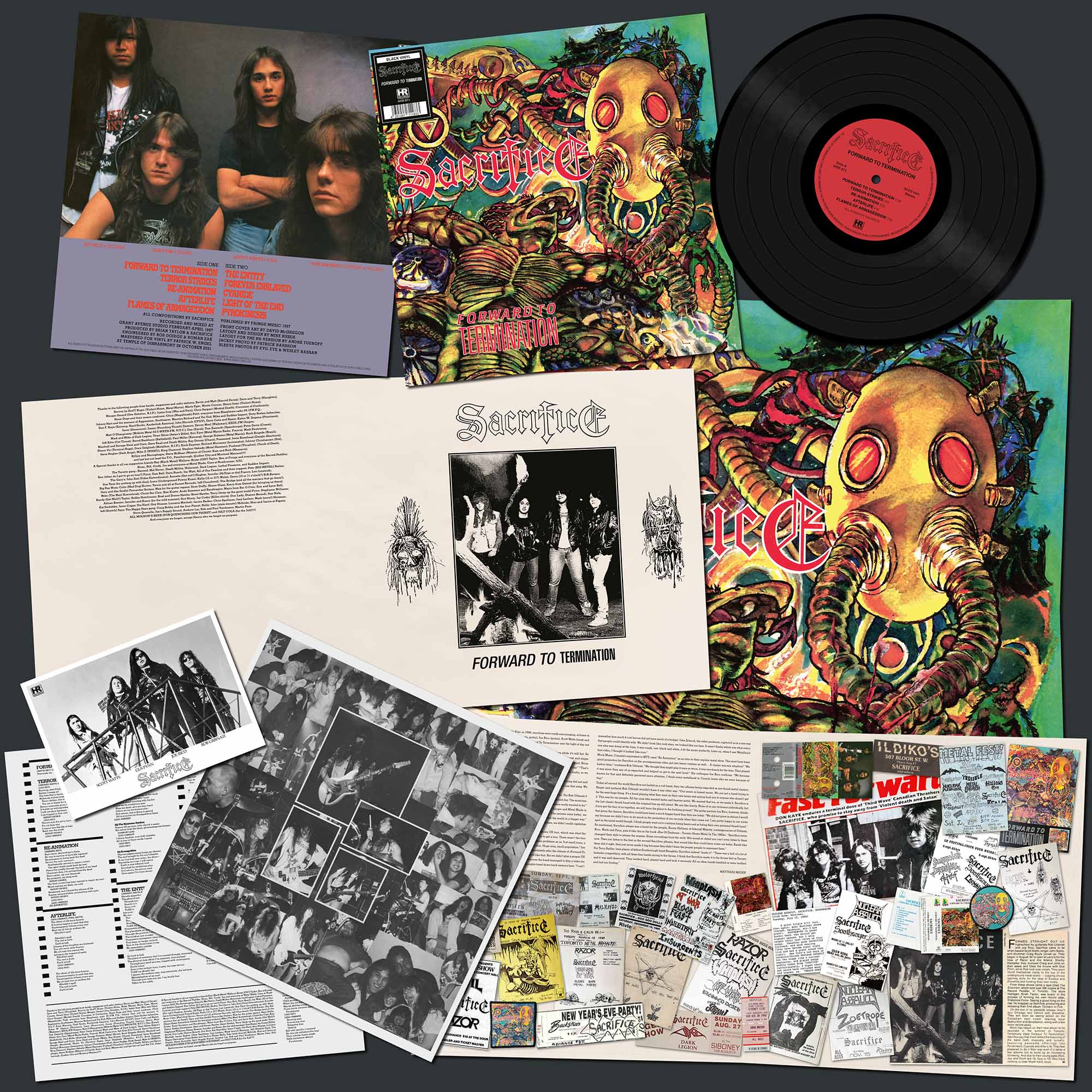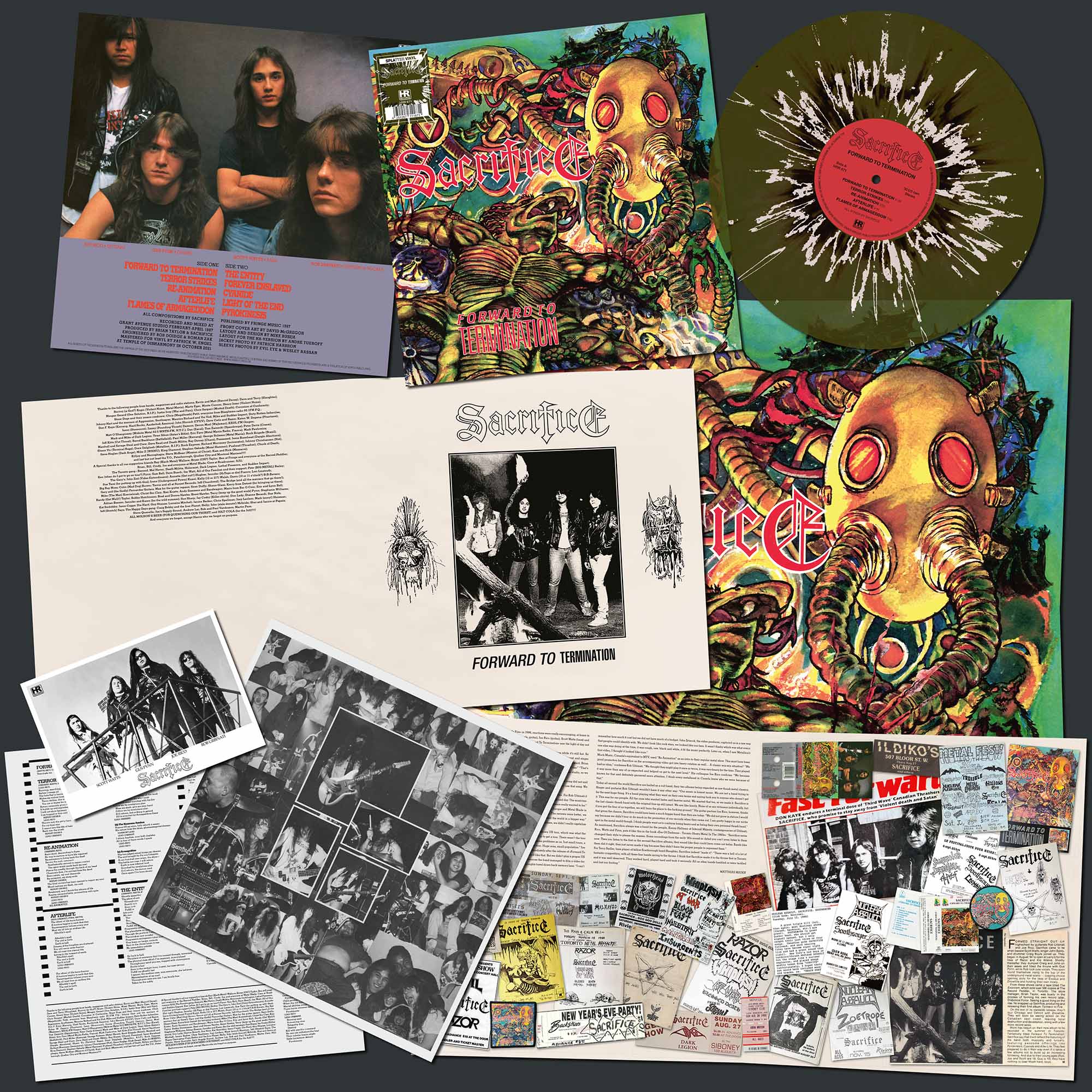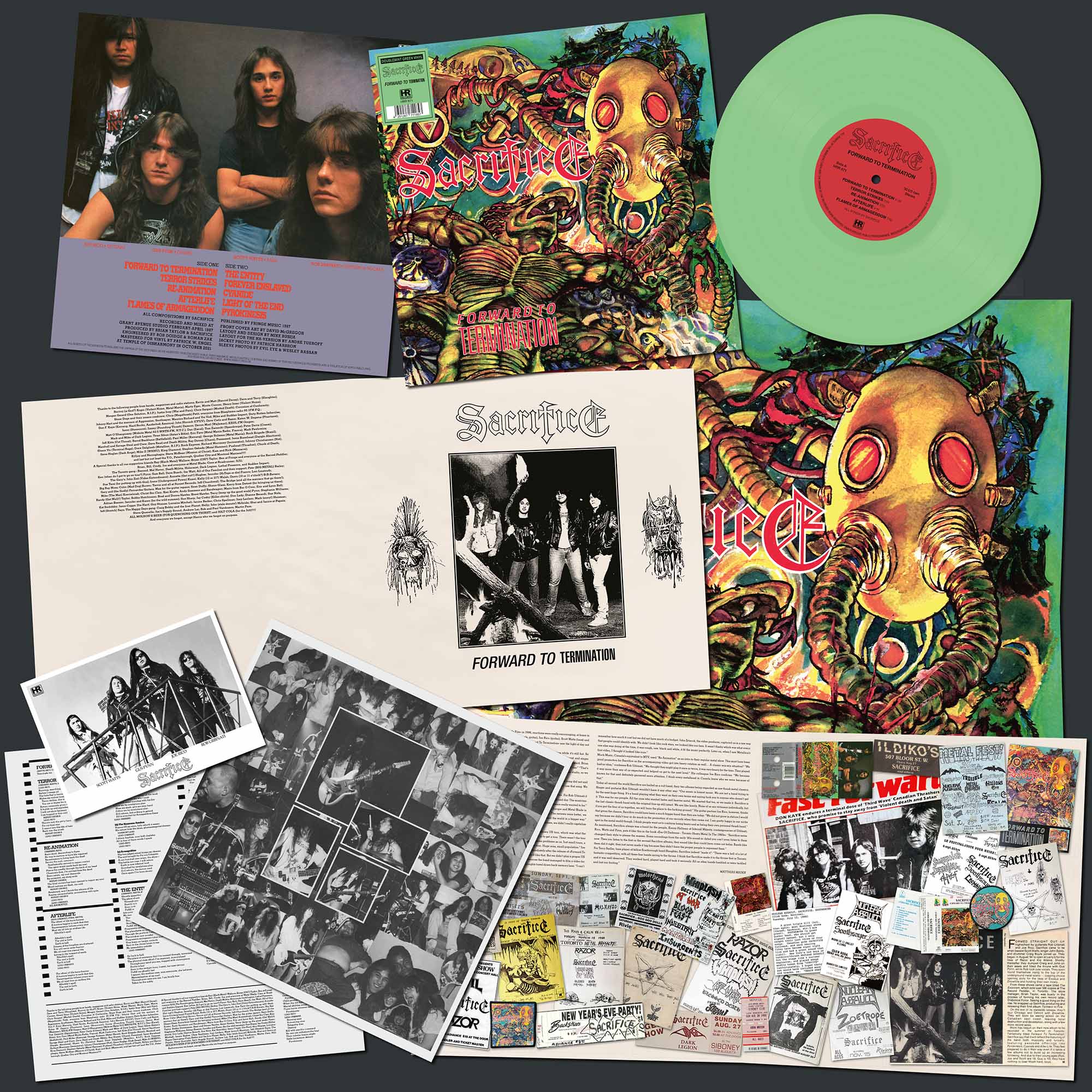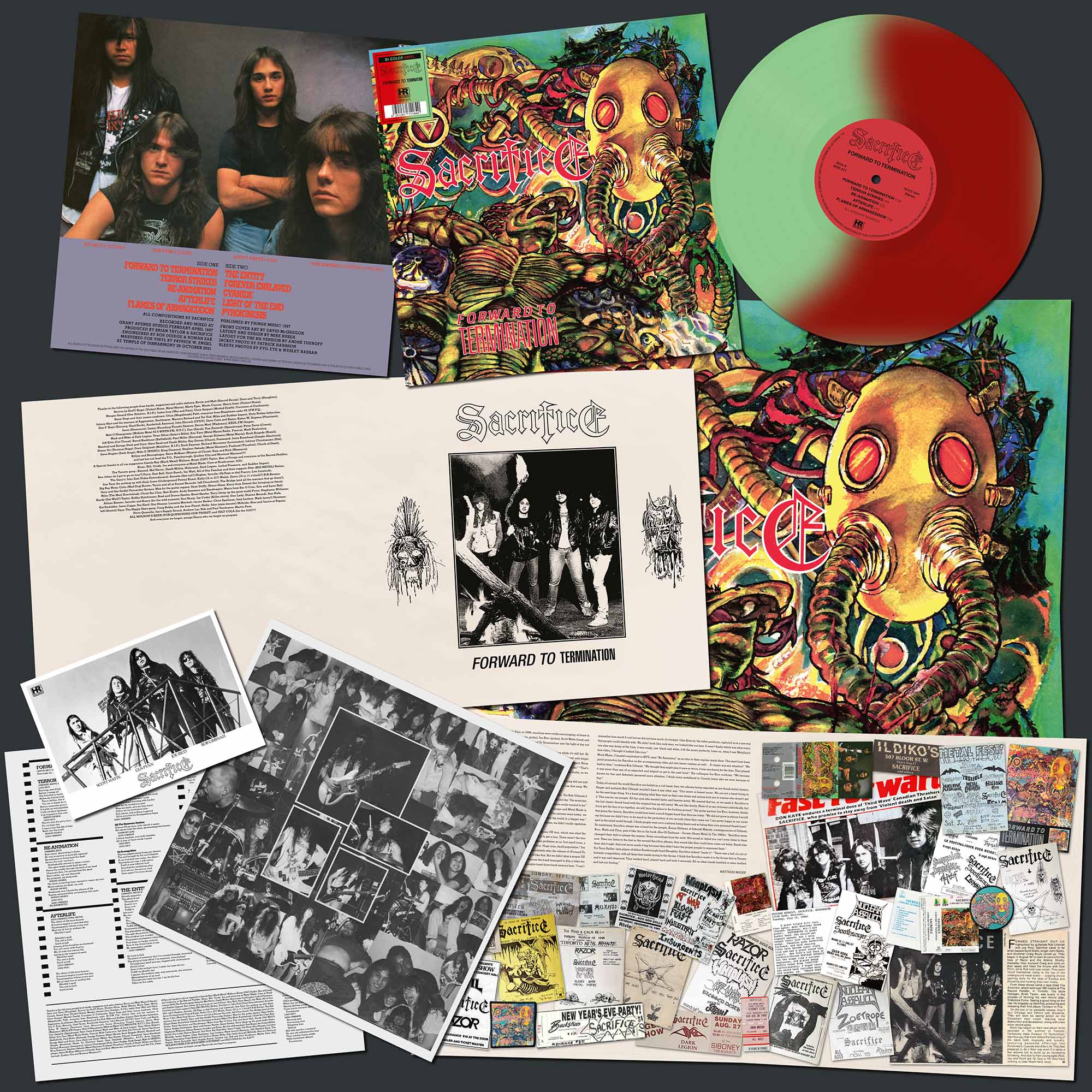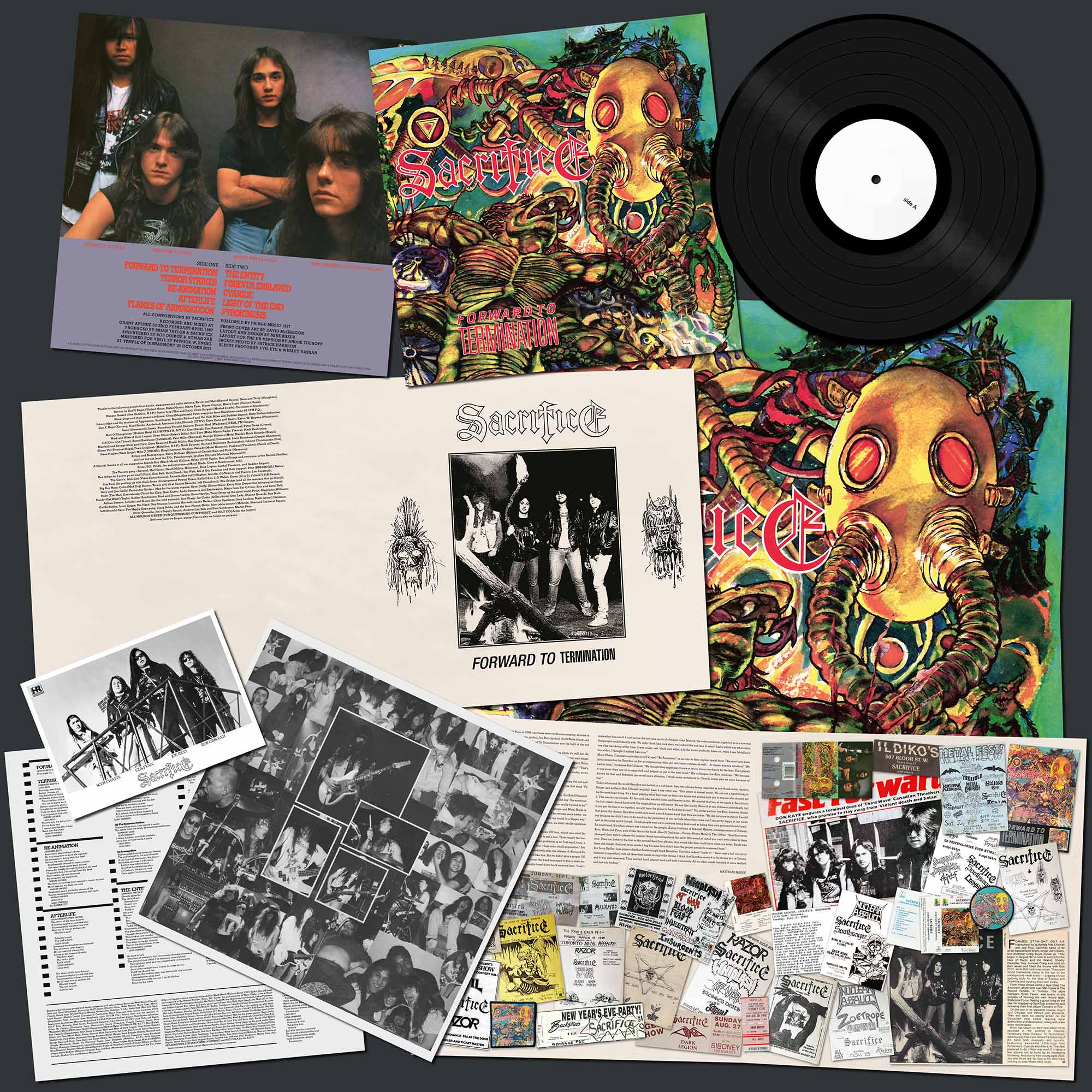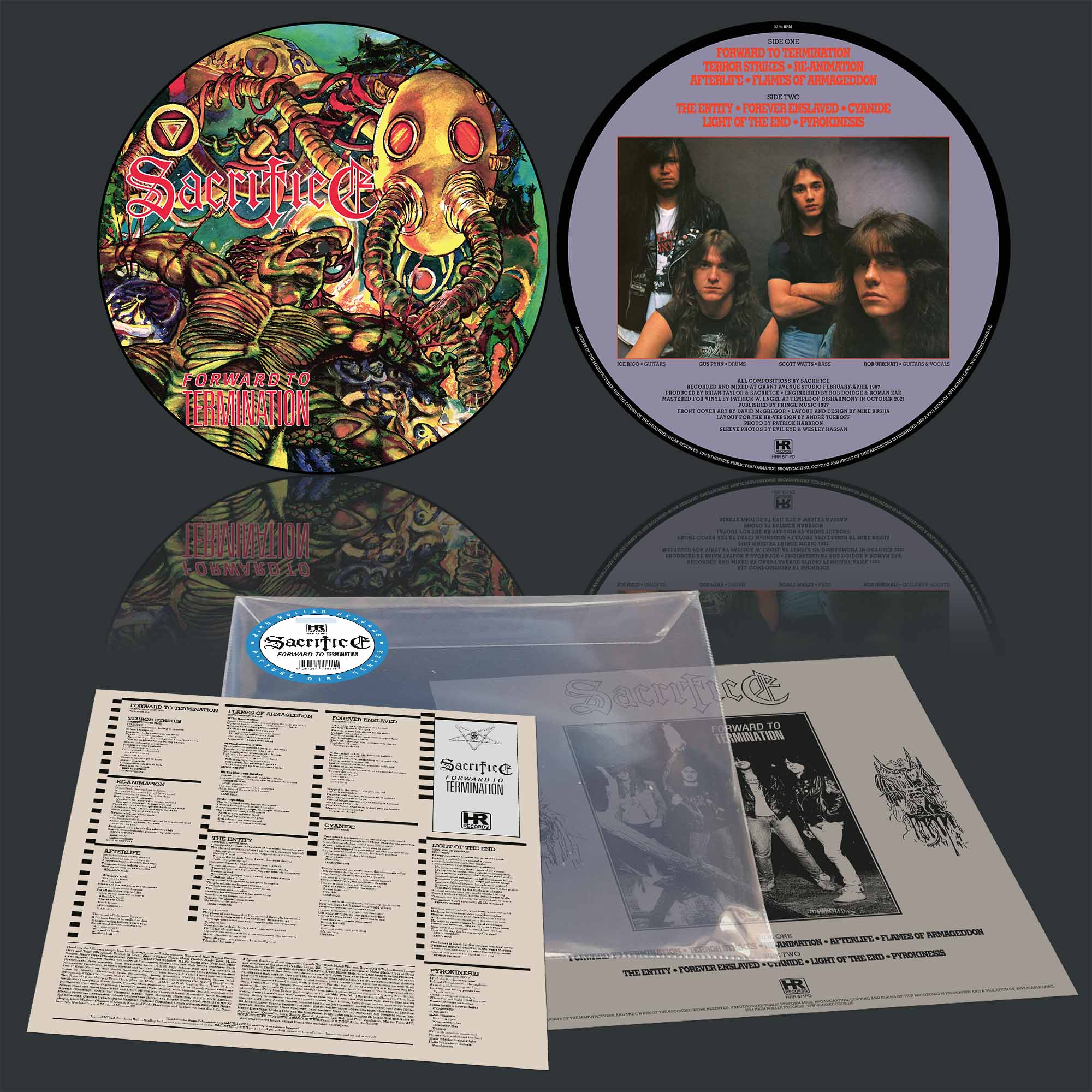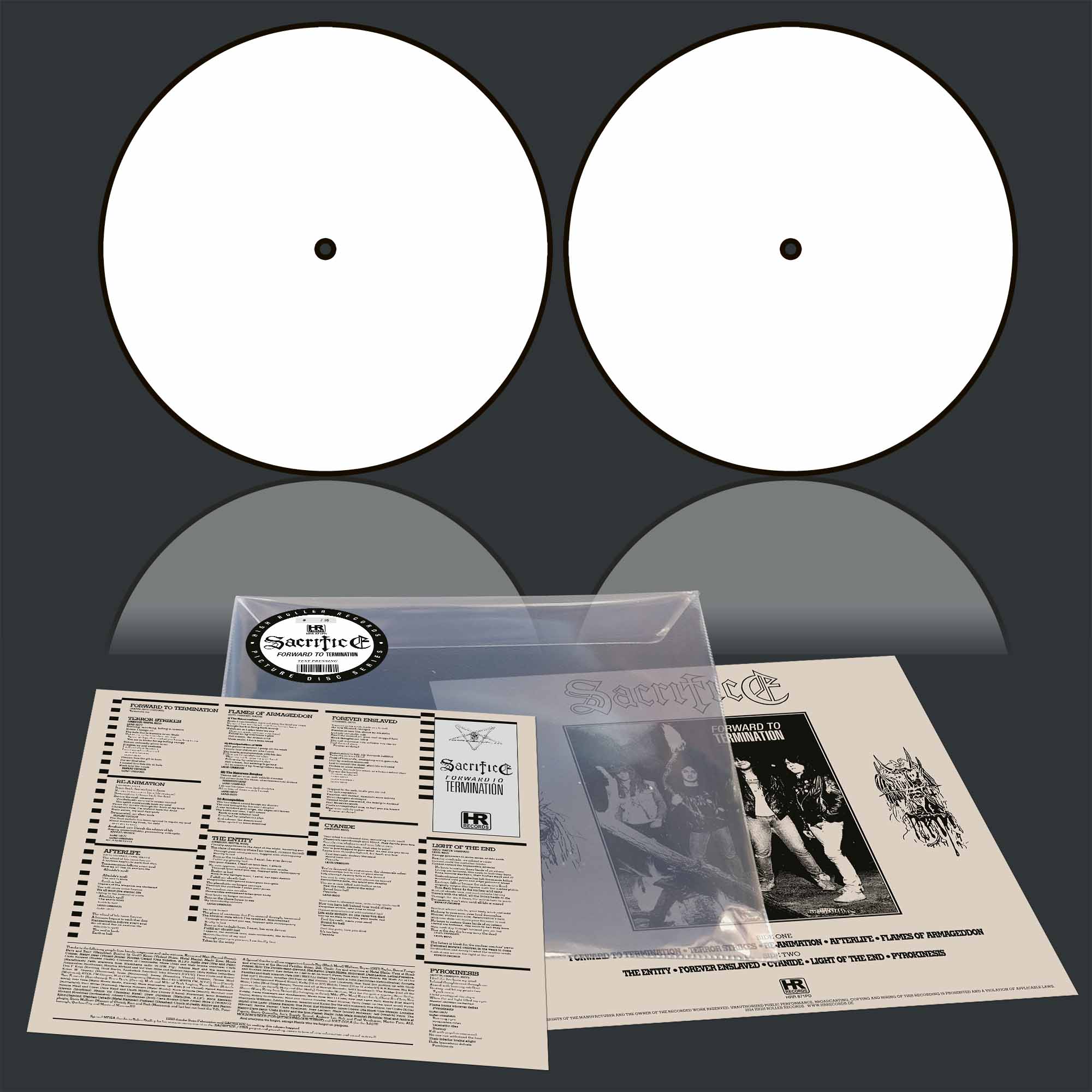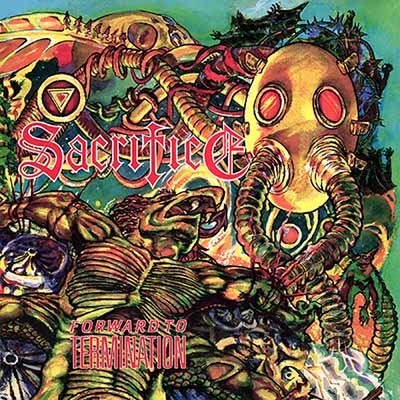 | ||||
| SACRIFICE - Forward to Termination LP | |
HRR 871LP, ltd 2000, 700 x black vinyl, 700 x swamp green w/ black & white splatter, 350 x doublemint green + 250 x red/ doublemint green bi-color vinyl (HRR mailorder exclusive), 425gsm heavy cardboard cover, 4 page insert, lyric sheet, poster, A5 photo card, PICTURE DISC: HRR 871PD, ltd 526, handnumbered, deluxe platic bag, cardboard insert | |
| Rob Urbinati -guitars & vocals Joe Rico - guitars Scott Watts - bass Gus Pynn - drums | |
| 01 Forward to Termination 02 Terror Strikes 03 Re-Animation 04 Afterlife 05 Flames of Armageddon 06 The Entity 07 Forever Enslaved 08 Cyanide 09 Light of the Dead 10 Pyrokinesis | |
AVAILABLE Picture Disc: AVAILABLE | |
When Sacrifice released their debut album »Torment In Fire« in 1986, reactions were really encouraging, at home in Canada as well as globally. Consequently Rob Urbinati (vocals, guitar), Joe Rico (guitar), Scott Watts (bass) and Gus Pynn (drums) wasted not time in recording the follow-up. »Forward To Termination« saw the light of day not even twelve months later in 1987 (again on Fringe Product).
It was the band’s mentor Brian Taylor who thought it would be best if the band was striking the iron while it’s still hot. So before 1986 ended, Sacrifice went into a basement studio to demo a selection of new compositions. Guitarist and singer Rob Urbinati explains: “We were excited to hear how they would sound, it felt like we were taking a big step forward. Brian played some tracks on his radio show and it created a buzz for our new songs. I think we recorded that in one day.” “That’s correct,” confirms guitar partner Joe Rico: “We decided to try out what the new songs would sound like in the studio, so we got into a small one to check it out, and it came out really good.”
During this session the band also recorded Discharge’s “Possibilities Of Life’s Destruction”, however, the song did not end up on the album. Today, Joe Rico does not have any idea why: “To be honest, I am not sure why we didn't use that song. We all loved Discharge so much back then ...”
One thing was clear though, all in the band preferred »Forward To Termination« over »Torment In Fire«. For Rob Urbinati it was “vastly superior, we felt it then and now.” Joe Rico even goes one step further: “For me it was night and day. The musicianship and songwriting on »Forward To Termination« was more the direction we wanted to go and always really wanted to be.”
The album was also released internationally this time around, being licensed by Roadrunner in Europe and Metal Blade in the States. As a result, the feedback was much healthier, as Rob Urbinati explains: “Definitely. The reviews were better, we started getting better shows. We were gaining a lot of new fans. Word was spreading all around the world in a bigger way.” “Yeah, we started to get attention in the underground,” adds Joe Rico. “Like mentioned elsewhere, we didn't really capitalize on it, otherwise the situation would have been much different, I would say.”
Unfortunately Metal Blade licensing »Forward To Termination« did not result in a full-blown US tour, which was what the band needed at the time to reach the next level. “No,” remarks Rob. “It was difficult for us to get a tour. There wasn’t the tour infrastructure in place yet that there is today. Some bands toured, but many had the same problems as us. Just small tours, a week here a few shows there. Canada was no problem, but it’s a very hard country to tour. Huge area, small population.” Joe also considers the lack of touring as one of the biggest problems Sacrifice faced immediately after the release of »Forward To Termination«: “We played some weekend shows and a short stint with COC and stuff like that. But we didn't play a proper US tour until Bolt Thrower and Believer in 1991.”
However, according to different sources the band managed to film a video for their song “Re-Animation” with a total budget of 500 $ … Rob Urbinati lets his thoughts travel down back memory lane: “I can’t remember how much it cost but we did not have much of a budget. John Zytaruk, the video producer, captured us in a raw way that people could identify with. We didn’t look like rock stars, we looked like our fans. It wasn’t flashy which was what everyone else was doing at the time, it was rough, raw, black and white, it fit the music perfectly. Later on, when I saw Metallica’s first video, I thought it looked like ours.”
Much Music, Canada’s equivalent to MTV, used “Re-Animation” as an intro to their regular metal show. This must have been good promotion for Sacrifice as the accompanying video got into heavy rotation as well … A classic win-win situation? “We had no idea,” confesses Rob Urbinati. “We thought they might play it once or twice, it was very heavy for the time. They played it way more than any of us expected and helped us get to the next level.” His colleague Joe Rico confirms: “We became known for that and definitely garnered more attention. I think every metalhead in Canada knew who we were because of that.”
Today all around the world Sacrifice are hailed as a cult band, their two albums being regarded as raw thrash metal classics. Singer and guitarist Rob Urbinati wouldn’t have it any other way: “Our music is honest music. We are not a band trying to be the next huge thing. It’s a band playing what they want on their own terms and saying fuck you to anyone who doesn’t get it. This was for our people. All the ones who wanted faster and heavier metal. We wanted that too, so we made it. Sacrifice is the last classic thrash band with the original line-up still intact. We are like family. None of us are virtuosos individually, but if you put the four of us together, we will burn the place to the fucking ground.” His guitar partner Joe Rico, however, thinks that given the chance, Sacrifice could have been a much bigger band than they are today: “We did not grow in stature I would say because we didn't tour or do much in the promotion of our records when they came out. I am pretty happy in our niche spot in the metal world though. I think people want us to continue being heavy and as being their own personal thrash band.”
As mentioned, Sacrifice always was a band for the people, Kenny Hallman of Infernäl Mäjesty, contemporaries of Urbinati, Rico, Watts and Pynn, puts it like this in the book »Eve Of Darkness – Toronto Heavy Metal In The 1980s«: “Sacrifice never changed their style to please the masses. Some recordings from the early ‘80s sound so dated you can’t even listen to them now. Then you listen to the first or the second Sacrifice albums, they sound like they could have come out today. Bands like them did it right, they just never made it big because they didn’t have the proper people to represent them.”
For Terry Sadler, bass player of fellow Scarborough band Slaughter, Sacrifice indeed “made it”: “There was a hell of a lot of fantastic competition, with all these fine bands racing to the throne. I think that Sacrifice made it to the throne first in Toronto and it was well deserved. They worked hard, played hard and took it seriously. All us other bands fumbled or were tackled and lost our footing.”
MATTHIAS MADER
